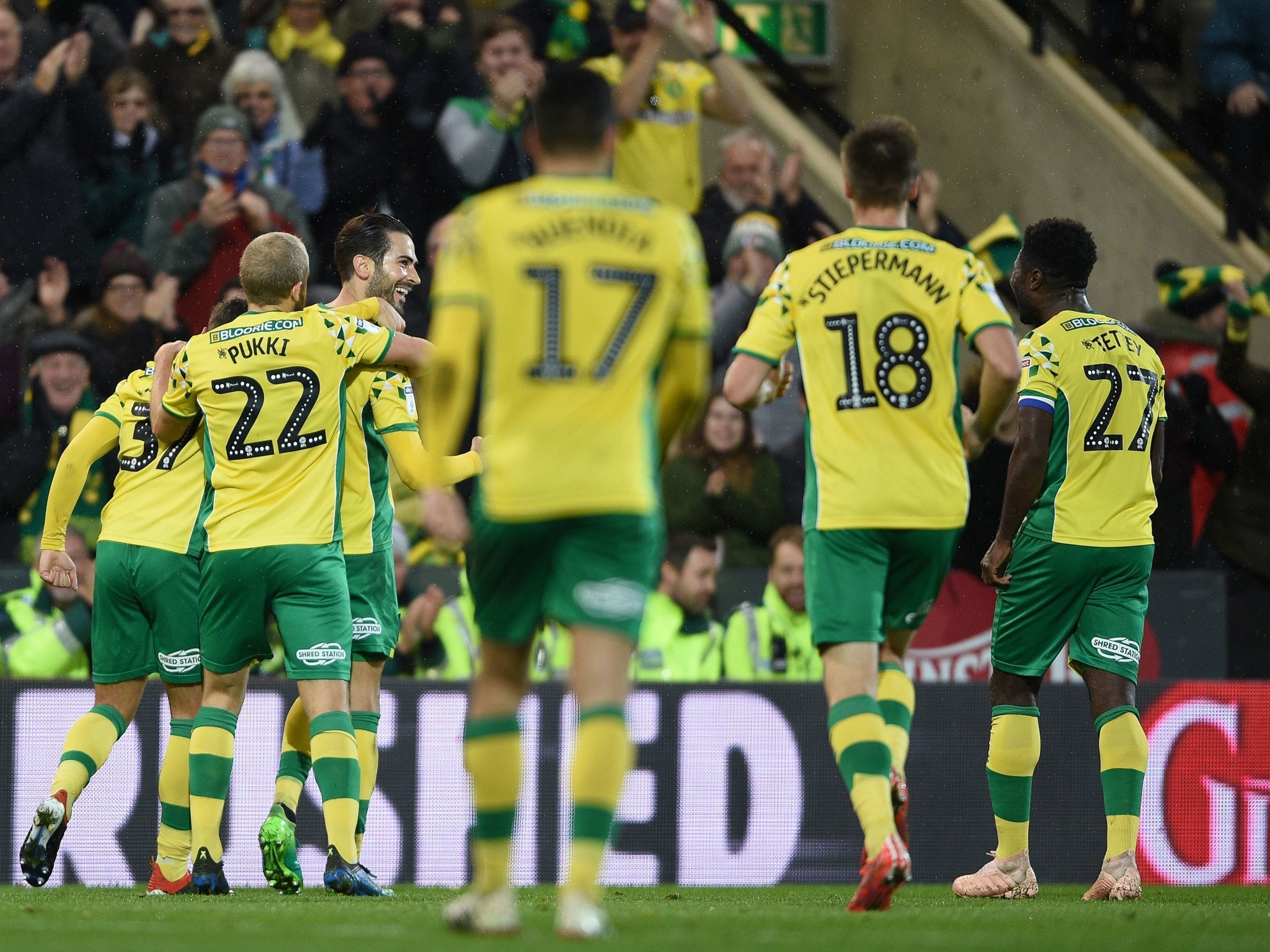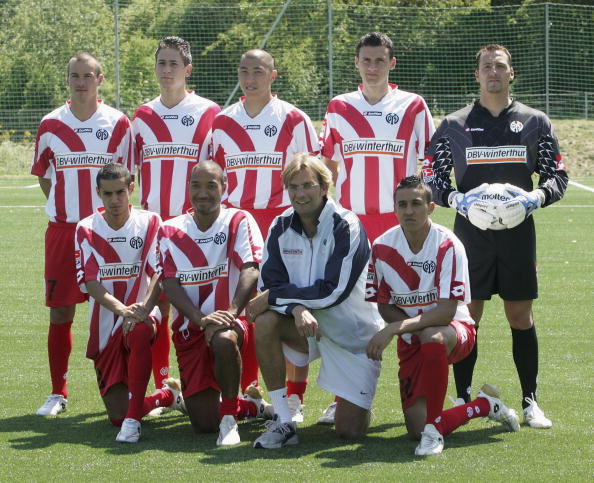Mario Vrancic’s journey from war-torn Yugoslavia via Jurgen Klopp to the brink of the Premier League
Interview: The Norwich City midfielder, who has played a key role in their promotion push, recounts his childhood move to Germany and the influence of Klopp at Mainz and Dortmund as his early career stuttered

Your support helps us to tell the story
From reproductive rights to climate change to Big Tech, The Independent is on the ground when the story is developing. Whether it's investigating the financials of Elon Musk's pro-Trump PAC or producing our latest documentary, 'The A Word', which shines a light on the American women fighting for reproductive rights, we know how important it is to parse out the facts from the messaging.
At such a critical moment in US history, we need reporters on the ground. Your donation allows us to keep sending journalists to speak to both sides of the story.
The Independent is trusted by Americans across the entire political spectrum. And unlike many other quality news outlets, we choose not to lock Americans out of our reporting and analysis with paywalls. We believe quality journalism should be available to everyone, paid for by those who can afford it.
Your support makes all the difference.When Mario Vrancic was about two years old, things were changing in his home town of Bosanski Brod, in what is now northern Bosnia. “All of a sudden people – normal people – had weapons,” Vrancic says, remembering what his father told him. “They were prepared for a war. Neighbours were shooting each other. Neighbours who used to live for ages together, then all of a sudden they became enemies.”
This was around the time of the Bosnian independence referendum in early 1992, as Yugoslavia was in the process of falling apart and war was breaking out. Vrancic’s father took the family over the border to Slavonski Brod in Croatia, but things weren’t exactly safe there either.
“I think it was when I was four…I do remember that we needed to swap houses…we needed to hide somewhere. I remember some bombs were dropped close to our house so we had to hide. I remember my uncle told me some bombs were dropped onto factories, just to weaken the people. Our house, 100m away was my grandfather’s house, another 100m was my uncle – everything got destroyed.”
Luckily, all of the wider Vrancic family escaped serious harm, largely because they seemed to anticipate the worst and escaped in good time. But it has, to say the least, been quite a journey that has taken him from those small Yugoslav towns, via Germany where he was mentored by Jurgen Klopp, and now to Norwich City, where he’s part of the Championship’s surprise package of the season.

After an underwhelming first season under Daniel Farke, Norwich are flying. Having kept faith with the German head coach they are second in the table, only behind Marcelo Bielsa’s Leeds United, and all after losing key men Josh Murphy and James Maddison to the Premier League last summer.
And of late Vrancic, who spent his first year or so at Carrow Road in and out of the team, has been a big part of their success, taking full advantage of injuries to Alex Tettey and Moritz Leitner to establish himself in their midfield. An elegant passer with a laser-guided left foot, you can see why Klopp, who coached Vrancic a decade ago at Mainz when their respective careers were just starting, recently called him “my player, my Mario Goetze”.
Vrancic came to Germany when he was around five years old, the family reasoning that the dangers even in Croatia were just too great and so they sought refugee status in the Rhineland. For a number of years they grappled with the German immigration system and, faced with the possibility of having to return to Bosnia, were on the verge of moving to America.
But Vrancic’s older brother Damir (also a pro footballer, currently player-assistant manager with FT Braunschweig in the German sixth tier) was playing for a local youth side, and by stroke of fortune their coach had just left a job in the immigration agency. He advised them to hold on, that rule changes for refugees were coming, and eventually the whole Vrancic family was given leave to stay. They’ve been there ever since.

Vrancic is reticent, even slightly bashful about his status as a refugee. He’s aware that, relative to millions of his compatriots, his story is not one of extreme hardship. Recently he had to be persuaded to take part in a Norwich community scheme about refugees, because he thought his story would not have any relevance to others who have suffered more traumatic journeys.
Don’t go to him for a first-hand account of the war in Yugoslavia, anyway. “I didn’t want to go too deep into things,” he says. “I’m sure more things happened, but I didn’t want to know, because I know my parents suffered. I didn’t want to annoy them with more questions. Thank God we left at an early stage.”
Having settled in Germany, Vrancic came through the Mainz youth system and was highly regarded, by Klopp and plenty of others. He was part of the German squad that won the 2008 Under-19s European Championship, although he ultimately chose to represent Bosnia-Herzegovina at senior level.
-and-Norwich-City's-Mario-Vranci.jpg)
However, that promise wasn’t quite fulfilled. He never established himself in the Mainz first-team, but in 2011 Klopp, now at Borussia Dortmund but having not forgotten Vrancic’s talent, signed him again. There he mostly played with the Under-23s side, coached by a certain David Wagner, who Vrancic says “helped put me back in the right direction”. After spells with Paderborn and Darmstadt, he became one of Norwich’s first signings after Farke arrived in the summer of 2017.
Klopp’s influence is still felt, over a decade since they started working together. “He helped me a lot, especially when I had a difficult time in my career, in the first few years when I didn’t develop how everyone expected. He always believed in me.
“I’m still in touch with him. I used to play with his son, his step-son is a good friend. He still has his house in Mainz where my parents live, so we’re still connected to each other. He’s still the same guy. He’s an incredible person.”
Even though he only spent a year there and didn’t play for the first-team, the broader influence of Dortmund on Vrancic is strong, if only because of the coaches that have guided his career. Klopp, who saw his talent from the start, then Wagner who built him back up after an errant couple of years, and now Farke, recruited from the Dortmund reserve team, at Norwich.
“All three expect that you give 100% each and every day, and they quickly realise it if you don’t,” he says. “They might say harsh words, but they remind you. That’s one thing they have in common.”
Farke almost sounds the most demanding of the three. “He wants every player to be a protagonist [on the field], to not just react to what the opponents do. He wants us to be a possession-based side, to give supporters something back with goals, to entertain them and to play nice football, not just to win 1-0 and nobody knows how, by parking the bus. That’s not our way of playing. He tries to brainwash us – if I can say it like that – in training so we don’t have to think about it on the pitch, and it’s automatic.”
At the moment Norwich look on course for a remarkable promotion. For Vrancic, the boy who had to leave his homeland at such a young age and whose career looked like it might fizzle out at various stages, making it to the Premier League would cap things off beautifully.
Join our commenting forum
Join thought-provoking conversations, follow other Independent readers and see their replies
Comments